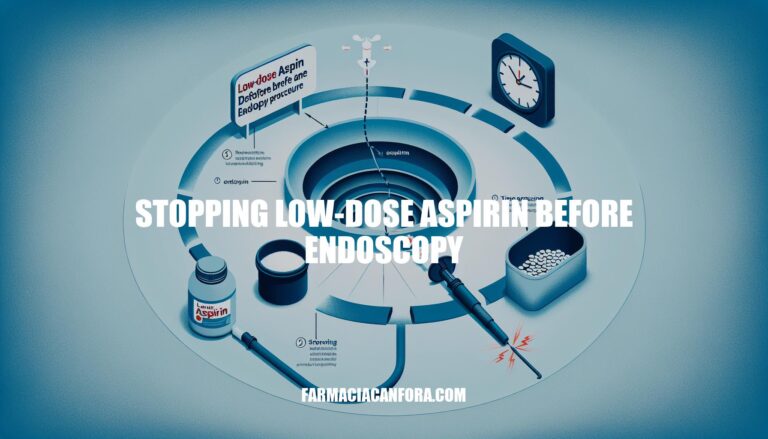Stopping low-dose aspirin before an endoscopy is crucial to minimize the risk of bleeding during the procedure. While aspirin helps prevent blood clots, which is beneficial for heart health, it also increases the likelihood of bleeding. Discontinuing aspirin reduces this risk, making the endoscopy safer. However, stopping aspirin can increase the risk of thrombotic events, such as heart attacks or strokes. Therefore, the decision to stop aspirin should be carefully balanced, considering both the bleeding risks and the potential for thrombotic complications. Consulting with healthcare providers is essential to make an informed decision.
Medical Guidelines
Medical guidelines for stopping low-dose aspirin before endoscopy vary based on the procedure’s risk and the patient’s thrombotic risk. Here are key recommendations from relevant authorities:
-
British Society of Gastroenterology (BSG) and European Society of Gastrointestinal Endoscopy (ESGE):
- For high-risk endoscopic procedures in patients at low thrombotic risk, it is recommended to discontinue P2Y12 receptor antagonists 7 days before the procedure. However, aspirin should be continued in patients on dual antiplatelet therapy (DAPT) .
- For all endoscopic procedures, continuing aspirin is generally recommended, except for specific high-risk procedures like endoscopic submucosal dissection (ESD) and large colonic endoscopic mucosal resection (EMR) .
-
American Society for Gastrointestinal Endoscopy (ASGE):
- The ASGE guidelines suggest that the decision to stop aspirin should consider the patient’s risk of thromboembolic complications and the bleeding risk associated with the procedure. Generally, aspirin is continued for most endoscopic procedures .
-
Stanford Health Care:
- They recommend stopping aspirin and aspirin products 5 days before an upper endoscopy, but emphasize consulting with a doctor, especially if there are concerns about stopping these medications suddenly .
These guidelines highlight the importance of balancing the risks of thrombosis and bleeding, and the need for individualized patient assessment. Always consult with a healthcare provider for personalized advice.
Risks of Continuing Low-Dose Aspirin
Continuing low-dose aspirin before an endoscopy can increase the risk of bleeding during the procedure. Aspirin inhibits platelet function, which is crucial for blood clotting. This can lead to prolonged bleeding from any biopsies or therapeutic interventions performed during the endoscopy.
Risks of Stopping Low-Dose Aspirin
Stopping low-dose aspirin before an endoscopy can lead to several risks:
- Increased Risk of Thromboembolic Events: Discontinuing aspirin can elevate the risk of thromboembolic events such as heart attacks, strokes, and stent thrombosis.
- Cardiovascular Complications: Patients taking aspirin for secondary prophylaxis or to protect a cardiac stent may face a higher risk of cardiovascular complications.
- Balancing Bleeding and Thrombosis Risks: While stopping aspirin might reduce the risk of bleeding during the procedure, it significantly increases the risk of thromboembolic events.
Patient Considerations
When deciding whether to stop low-dose aspirin before an endoscopy, patients and healthcare providers should consider the following factors:
- Bleeding Risk: Aspirin increases bleeding risk due to its antiplatelet effects. Assess the potential for significant bleeding during the procedure.
- Cardiovascular Risk: Evaluate the patient’s risk of cardiovascular events. For those with a history of heart disease or stents, stopping aspirin may increase the risk of heart attack or stroke.
- Type of Endoscopy: The invasiveness of the procedure matters. Less invasive procedures might not require stopping aspirin, while more invasive ones might.
- Patient’s Medical History: Consider the patient’s overall health, including any history of gastrointestinal bleeding or other conditions that might be exacerbated by aspirin.
- Alternative Medications: Discuss potential alternatives or bridging therapies that might mitigate risks if aspirin is stopped.
These factors should be carefully weighed in consultation with the healthcare provider to make an informed decision.
Case Studies
Here are some case studies:
-
Beneficial:
- Case Study 1: In a randomized controlled trial (RCT) of 220 patients on low-dose aspirin for secondary prevention, aspirin interruption was associated with a threefold increased risk of cardiovascular or cerebrovascular events.
- Case Study 2: A study found that stopping low-dose aspirin before endoscopy reduced the risk of gastrointestinal bleeding in patients undergoing high-risk procedures.
-
Detrimental:
- Case Study 1: In patients on long-term low-dose aspirin for secondary prevention, aspirin interruption led to 70% of cardiovascular or cerebrovascular events occurring within 7–10 days after interruption.
- Case Study 2: Research indicated that stopping low-dose aspirin even for short periods increased the risk of thrombosis without significantly reducing bleeding events during endoscopy.
Stopping Low-Dose Aspirin Before Endoscopy: A Delicate Balance
Stopping low-dose aspirin before an endoscopy is crucial to minimize bleeding risk, but discontinuing it can increase thrombotic events.
Medical guidelines vary based on procedure risk and patient thrombotic risk. Key recommendations include continuing aspirin for most procedures, except high-risk ones like ESD and EMR.
The decision should be carefully balanced considering both risks. Factors to consider include bleeding risk, cardiovascular risk, type of endoscopy, patient’s medical history, and alternative medications.
Consultation with healthcare providers is essential for personalized advice.


